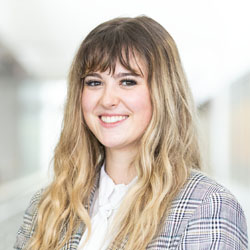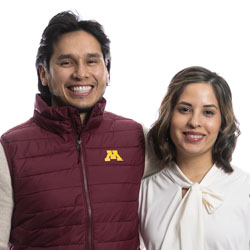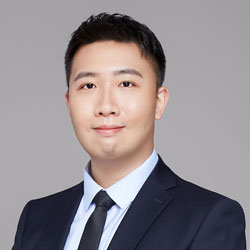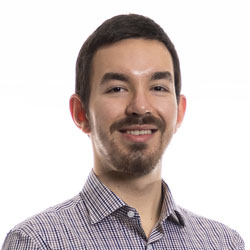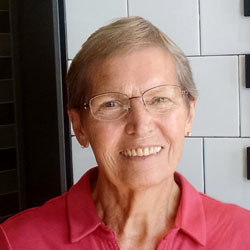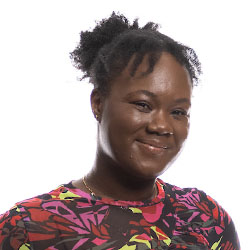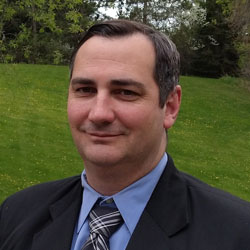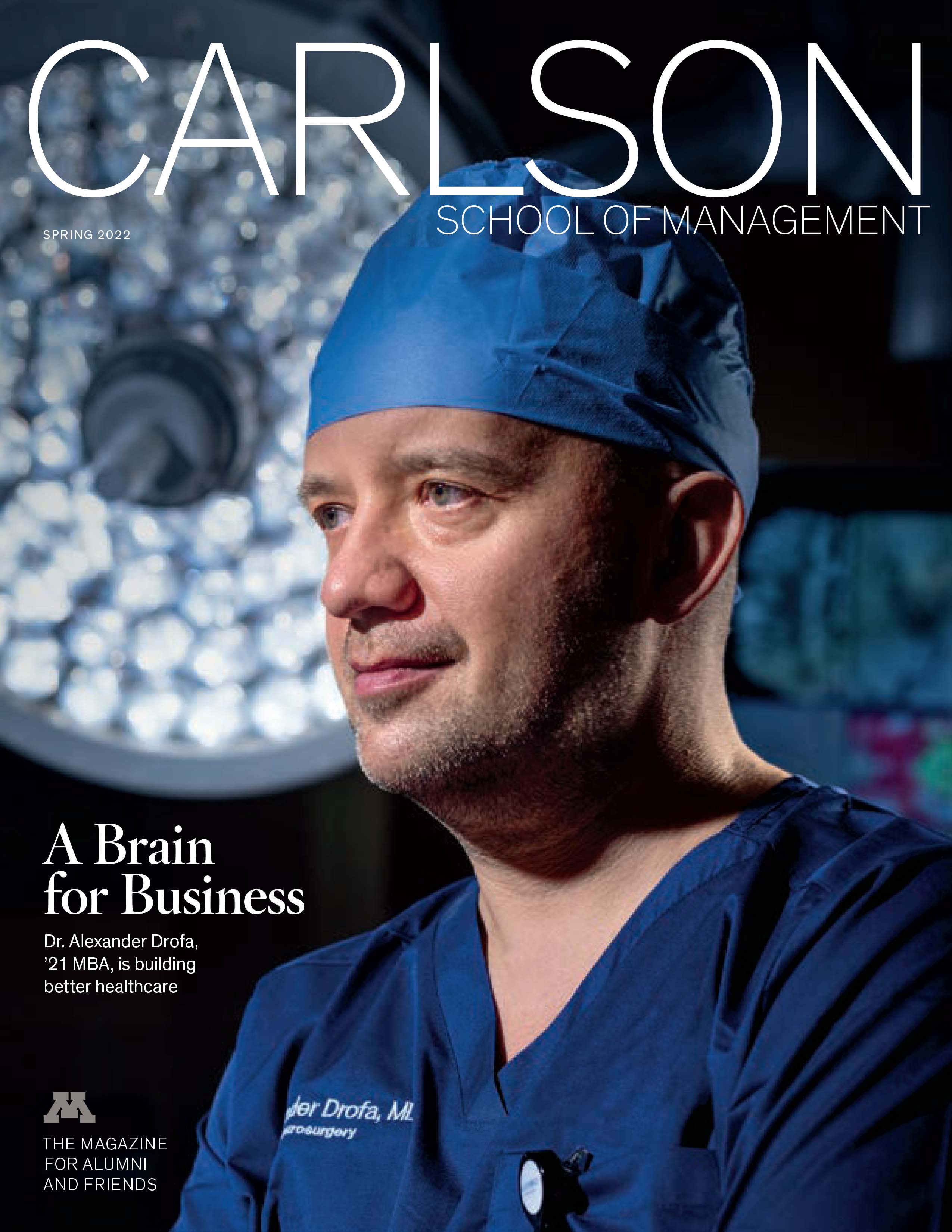
The Class of 2022 Finds Success Despite Pandemic Obstacles
Friday, April 8, 2022
BY ADAM OVERLAND
When the pandemic shut the world down, it would have been easy for students to feel like their educational experience locked down, too. Instead, these Carlson School students found a world of possibility and potential, both within and out in the wider world.
Deanna Wallin
Management Information Systems; Marketing
Deanna Wallin was in Denmark, studying abroad, when the pandemic began.
“I went straight home, and I spent those last months of the semester taking classes from the U in my childhood bedroom.”
As the months wore on, Wallin decided to increase her credit load.
“I thought, ‘If I’m taking online classes, I might as well just focus on school.’ So I just powered through it, thinking that at least if senior year is not online, I can relax a little bit and enjoy it.”
While online learning was initially challenging, Wallin says a lot of good came from the experience, including her approach to in-person learning and work.
“Before [online courses], learning for me was very passive. … Now I get to know my professors, I get to know people in my classes more, and I think I make more out of it than I used to. I take less for granted.”
As an honors student, she’s working on her thesis, researching and writing about misinformation, vaccine hesitancy, and persuasion tactics surrounding COVID-19.
“[The pandemic] actually shifted my perspective about the world and where I fit into it and what I care about,” Wallin says. “I’m just seeing so many people get affected by this, and seeing my own family and friends getting sick, people ending up in the hospital who don’t need to be.”
She credits many of the skills she has learned through the Carlson School for giving her a foundation on which to build.
“A lot of the critical thinking skills I’ve learned in classes kind of proves that even if it’s not necessarily a business topic, learning how to analyze an ambiguous set of data and information that necessarily have a clear path is something applies pretty much anywhere. that’s something that the Carlson School has been really good at teaching—because in business, everything’s ambiguous.”
After graduation, Wallin is joining Boston Consulting Group’s Minneapolis office, but she believes her future is wide open. Maybe she will on a path toward public health.
“I think the change skills I have learned would be a big part of working in public health. And using my background of marketing and studying consumer behavior sets me up really well for that.”
Cecilio and Claudia Santana
Part-Time MBA
Cecilio and Claudia Santana started the Carlson Part-Time MBA program in the spring of 2018, just months after marrying.
Both working professionals—he from Minnesota, she from Texas—they met through their careers. Cecilio worked as a civil engineer; Claudia in marketing, at Target.
Claudia says she chose the Carlson School because many of her coworkers had graduated from the MBA program, and she wanted a school with national recognition.
“There are not a lot of Latinos with MBAs, so being able to change that and to have a seat at the table in our organizations was important,” Claudia says. “I want to continue to grow and develop as a leader and show that I'm just as capable as anyone else."
Cecilio, meanwhile, was looking for a career change, and Claudia inspired him.
“I didn’t want to be pigeonholed as just an engineer, but have a broad background that could be applied to a lot of different areas,” Cecilio says.
In April 2020, the Santanas welcomed their second child.
“That was a really challenging and exciting time for both of us,” Claudia says. “I gave birth to our son and then immediately signed up for a summer course. With the pandemic, my family wasn’t able to be with me during postpartum recovery, and so I felt very isolated. I opted to take a summer course so I could have some interactions with peers.”
The course, with its international business focus, was perfect for the times.
“We were talking about all the supply chain impacts, GDP loss globally, what the pandemic meant for businesses across the world … our professor actually tailored the course to examine a lot of those issues,” Claudia says.
What’s gotten them through was experiencing this together.
“We hold each other accountable, we motivate each other, we remind each other why we’re doing this,” Claudia says. “I think it’s made our relationship stronger and our friendship stronger.”
In mid-2021, Claudia moved to a different team at Target that uses her new skills in finance, marketing and logistics. “And I’m definitely looking for that leadership role.”
Not surprisingly, so is Cecilio, who now works for Target’s real estate division.
“I’ve found that I don’t just want a seat at the table. I want to be the one leading,” he says.
Wenli (Stephen) Deng
Carlson Executive MBA—China Program
Stephen Deng’s plans weren’t drastically disrupted by COVID-19. As a member of the Carlson Executive MBA–China Program (CHEMBA), now in its 20th year, Deng was planning to take many of his courses virtually from Beijing, although U of M faculty do teach some classes on-site in China.
“Although the teaching process was quite challenging—we really needed to leverage a lot of tools like Zoom, Canvas, and discussion boards—I didn’t feel the loss of the teaching quality,” Deng says.
Classes within the CHEMBA program are primarily co-taught by faculty appointed from the Carlson School of Management, Lingnan (University) College, or other prestigious business schools. Deng, who works for BFE Corporation Limited, a global e-commerce logistics and warehouse provider headquartered in Guangzhou, says he’s already seeing benefits from the program.
In early January, Deng was placed in charge of BFE’s global warehousing operation, including North America, after working since 2019 as business unit and marketing director for Europe, Australia, and China.
Deng says his new responsibilities are broad, from overseeing operations functions to marketing, finance, and human resource aspects.
“It brings me a totally new perspective of understanding, because when I was back in my bachelor program, I surely learned some of these things. But I didn’t understand it because I didn’t have the experience,” Deng says. “Now, in the CHEMBA program, it’s closely linked with what I’ve done in the past 10 or so years in my work.”
In fact, Deng recently collaborated with the CEO of BFE on a new organization optimization project, not long after he’d completed a course on international HR management.
“My boss, who is an expert in HR, we’re having some discussion, and I can see the surprise from her eyes and from her face. She was like, ‘Stephen, you’re on the same page with me.’ I could feel the respect from her,” Deng says. “This was really a big moment for myself. I have already surprised my boss and I’ve been leveled up.”
Deng, who was voted by his classmates and the CHEMBA council as the representative of his cohort, is also its youngest member, at age 32.
He’s not yet sure about travel plans with the pandemic, but hopes to graduate in person. While COVID-19 derailed Deng’s plans to the see the “famous Minnesota snow,” he is hoping to walk across the stage at commencement.
Lazar Lazarov
Full-Time MBA
Lazar Lazarov, a Fulbright Scholar from Dobrich, Bulgaria, says he always wanted to experience the U.S. educational system, then take new ideas back to his country.
As the former executive director of the BEST Foundation (Bulgarian English Speech and Debate Tournaments), Lazarov organized English-language speech and debate tournaments for Bulgarian high school students and sponsored the country’s largest international public speaking tournament.
But after six years with BEST, Lazarov, who is also president of the FTMBA Class of 2022, felt like he needed new ideas to help organizations like BEST reach their goals.
“[BEST] showed me how much I didn’t know. So I thought, ‘You know, an MBA would be really good so that the next time I really believe in a cause and maybe end up in a leadership position, I know every single thing to do,’” Lazarov says.
At the Carlson School, Lazarov is particularly interested in corporate strategy. He believes that kind of work is important considering the country’s political and cultural history, which changed after the fall of communism in 1989.
“It’s a very young private space—we’ve had private, for-profit companies held in Bulgaria for what is now 32 years, as opposed to other countries around the world, with hundreds and hundreds of years of experience.”
Lazarov says that he chose the Carlson School because it fits with his ambition to make a difference.
“I think the Carlson School stands for something … you’ve got the ‘business as a force for good,’ but behind that slogan there are hundreds of faculty and staff who are actually looking to enact some good change in the world.”
Lazarov believes he’s learned how to collaborate better digitally because of the pandemic.
“As a team leader, I really had to learn how to organize every single thing that needed to be discussed, and how we come together and integrate it. That’s something I’ll be taking to my future workplace.”
Kay Lacher
Accounting
Kay Lacher’s pursuit of a college degree started decades before the COVID-19 pandemic.
In 1973, Lacher enrolled in college courses at North Hennepin Community College, then transferred to the University of Minnesota’s business school. A single mother of two boys, Lacher balanced her family life and her job with her studies.
In 1980, she dropped out of school, just five credits short of her degree.
“My sons needed me,” she says. “I really needed to be home with them, so I dropped out to be with them.”
After working for the U.S. Olympic Committee and various other organizations over the years and compiling a book written by her father—Quaday’s Quotes, 70 Years on a Blue Earth River Valley Farm—Lacher still had one accomplishment on her bucket list: finishing her college degree.
Lacher plans to walk in the Carlson School’s commencement ceremony, just as she did in 1980, but with a feeling of genuine achievement. She will have earned her degree for real this time.
Learning to study after a 40-year absence was a challenge, Lacher admits. She also accomplished her goal to improve her cumulative GPA.
Her diploma is hanging in her home office, and she is amazed every day that she has it.
With a UCard in her purse and new University of Minnesota Alumni Association membership, Lacher says that making the decision to finish her degree at age 78 was a big deal. “I feel a real sense of pride.”
Maria Morande
Management Information Systems
Before she turned 18, Maria Morande had already been attending courses at the U of M for two years through the Postsecondary Enrollment Options (PSEO) program, which allows high school students to earn college credit.
When the pandemic struck, she was just getting settled on campus in a more official capacity. Instead of letting that stop her, she took steps to get more involved.
One experience Morande has cherished is the Carlson Student Ambassadors program, where she talks to kids about going to college and business school. “Being involved and joining other student groups has really helped me to build myself up and feel like I’m part of that larger community,” she says.
Morande also serves on the executive board of the National Association of Black Accountants, which supports Black students interested in business and technology, and she’s particularly proud of her involvement as the undergraduate student representative to the Carlson School Dean’s Advisory Committee on Diversity, Equity, and Inclusion, which is supporting the school’s efforts to address racial justice and inclusivity within the Carlson School.
“To have that firsthand experience even before entering my professional life is something that I think is going to be so beneficial for me as a leader,” she says.
She also believes online learning played a role in her leadership development, helping to ease her into spaces she was previously uncomfortable in occupying.
“I remember a competition I was a part of, and my teammates and I wanted to learn more about this offering from a consulting firm, and we decided, ‘Let’s just call the global partner for this and see if he’ll be open to meeting with us.’” They were.
“Having that sort of brazenness … that opportunity to share space with people just by asking for 15 minutes for a quick Zoom was something that really wouldn’t have happened without being online, and essentially without the pandemic I don’t know that I would have gained that mindset of not limiting myself,” Morande says.
As she nears graduation, she’s realizing she’s ready to lead.
“[Before college] I thought of myself as somebody who was completely leadership averse,” Morande says. “But I feel like I’ve just completely flipped around. I have become so much more confident and I’ve become somebody who no longer shies away from being looked to as a leader. Carlson [School] has been just so instrumental for me.”
New Grad Seeing the Bigger Picture
Tavis Pike, ’21
MS, Supply Chain Management
Tavis Pike was deployed with the Minnesota Red Bulls National Guard First Brigade in Kuwait when he began the Carlson School’s MS in Supply Chain Management program in September 2020. But he almost didn’t enroll.
He had started the application, but then deployed. Scott Martens, the professional director of the Supply Chain Management Program, asked him why the application never went through. When Pike explained he didn’t think he would return in time, or may have to quarantine, Martens proffered the COVID new normal: going entirely online.
Pike worked and traveled between Kuwait and Fort Hood, Texas. He only missed one class.
The program was a perfect fit. As a property book officer, now with the 34th Combat Aviation Brigade, he already works in logistics: He ensures that when his brigade deploys, soldiers have everything they need, from boots to helicopters, food to medical supplies.
Pike says he chose the program partly because as an active Guard member with three young children, graduating quickly was key. It’s also popular with veterans, who represented more than 35 percent of the MS in Supply Chain Management class of 2021.
Pike says the experience changed his perspective.
“Instead of thinking about how to get supplies from here to there, it’s trying to think more about how it affects people—seeing the bigger picture,” he says. “We do that in the military quite a bit, but to actually personalize how you’re going to try to work through your corporation to make other people’s lives better. … It was a kind of awakening for me.”
Pike, who has nearly 23 years total service and 19 years of active duty with the National Guard, plans to retire in 2023—when he hopes to begin a new career.
“At this point, supply chain managers are definitely a need. A lot of companies are focusing on trying to get supply chains right, so this should end up helping me get a job.”
